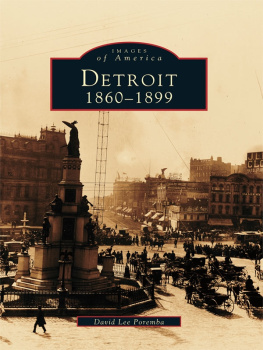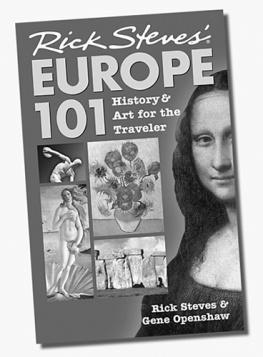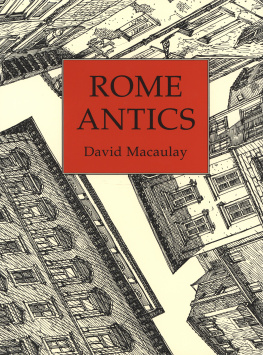CHAPTER I. THE ROME OF REAL LIFE.
My first recollections of Rome date from too long ago, and from too early an age, for me to be able to recall with ease the impression caused by its first aspect. It is hard indeed for any one at any time to judge of Rome fairly. Whatever may be the object of our pilgrimage, we Roman travellers are all under some guise or other pilgrims to the Eternal City, and gaze around us with something of a pilgrims reverence for the shrine of his worship. The ground we tread on is enchanted ground, we breathe a charmed air, and are spellbound with a strange witchery. A kind of glamour steals over us, a thousand memories rise up and chase each other. Heroes and martyrs, sages and saints and sinners, consuls and popes and emperors, people the weird pageant which to our minds eye hovers ever mistily amidst the scenes around us. Here above all places in Gods earth it is hard to forget the past and think only of the present. This, however, is what I now want to do. Laying aside all memory of what Rome has been, I would again describe what Rome is now. And thus, in my solitary wanderings about the city, I have often sought to picture to myself what would be the feelings of a stranger who, caring nothing and knowing nothing of the past, should enter Rome with only that listless curiosity which all travellers feel perforce, when for the first time they approach a great capital. Let me fancy that such a travellera very Gallio among travellersis standing by my side. Let me try and tell him what, under my mentorship, he would mark and see.
It shall not be on a bright, cloudless day that we enter Rome. To our northern eyes the rich Italian sun-light gives to everything, even to ruins and rags and squalor, a deceptive grandeur, and a beauty which is not due. No, the day shall be such a day as that on which I write; such a day in fact as the days are oftener than not at this dead season of the year, sunless and damp and dull. The sky above is covered with colourless, unbroken clouds, and the outline of the Alban and the Sabine hills stands dimly out against the grey distance. It matters little by what gate or from what quarter we enter. On every side the scene is much the same. The Campagna surrounds the city. A wide, waste, broken, hillock-covered plain, half common, half pasture land, and altogether desolate; a few stunted trees, a deserted house or two, here and there a crumbling mass of shapeless brickwork: such is the foreground through which you travel for many a weary mile. As you approach the city there is no change in the desolation, no sign of life. Every now and then a string of some half-dozen peasant-carts, laden with wine-barrels or wood faggots, comes jingling by. The carts so-called, rather by courtesy than right, consist of three rough planks and two high ricketty wheels. The broken-kneed horses sway to and fro beneath their unwieldy load, and the drivers, clad in their heavy sheepskin jackets, crouch sleepily beneath the clumsy, hide-bound framework, placed so as to shelter them from the chill Tramontana blasts. A solitary cart is rare, for the neighbourhood of Rome is not the safest of places, and those small piles of stone, with the wooden cross surmounting them, bear witness to the fact that a murder took place not long ago on the very spot you are passing now. Then, perhaps, you come across a drove of wild, shaggy buffaloes, or a travelling carriage rattling and jilting along, or a stray priest or so, trudging homewards from some outlying chapel. That red-bodied funereal-looking two-horse-coach, crawling at a snails pace, belongs to his Excellency the Cardinal, whom Papal etiquette forbids to walk on foot within the city, and whom you can see a little further on pottering feebly along the road in his violet stockings, supported by his clerical secretary, and followed at a respectful distance by his two attendant footmen with their threadbare liveries. At last, out of the dreary waste, at the end of the interminable ill-paved sloughy road, the long line of the grey tumble-down walls rises gloomily. A few cannon-shot would batter a breach anywhere, as the events of 1849 proved only too well. However, at Rome there is neither commerce to be impeded nor building extension of any kind to be checked; the city has shrunk up until its precincts are a world too wide; and the walls, if they are useless, are harmless also; more, by the way, than you can say for most things here. There is no stir or bustle at the gates. Two French soldiers, striding across a bench, are playing at picquet with a pack of greasy cards. A pack-horse or two nibble the blades of grass between the stones, while their owners haggle with the solitary guard about the octroi duties. A sentinel on duty stares listlessly at you as you pass,and you have entered Rome.
You are coming, I will suppose, from Ostia, and enter therefore by the Porta San Paolo; the gate where legends tell that Belisarius sat and begged. I have chosen this out of the dozen entrances as recalling fewest of past memories and leading most directly to the heart of the living, working city. You stand then within Rome, and look round in vain for the signs of a city. Hard by a knot of dark cypress-trees waves above the lonely burial-ground where Shelley lies at rest. A long, straight, pollard-lined road stretches before you between high walls far away; low hills or mounds rise on either side, covered by stunted, straggling vineyards. You pass on. A beggar, squatting by the roadside, calls on you for charity; and long after you have passed you can hear the mumbling, droning cry, Per lamore di Dio e della Santa Vergine, dying in your ears. On the wall, from time to time, you see a rude painting of Christ upon the cross, and an inscription above the slit beneath bids you contribute alms for the souls in purgatory. A peasant-woman it may be is kneeling before the shrine, and a troop of priests pass by on the other side. A string of carts again, drawn by bullocks, another shrine, and another troop of priests, and you are come to the rivers banks. The dull, muddy Tiber rolls beneath you, and in front, that shapeless mass of dingy, weather-stained, discoloured, plaster-covered, tile-roofed buildings, crowded and jammed together on either side the river, is Rome itself. You are at the citys port, the Ripetta or quay of Rome. In the stream there are a dozen vessels, something between barges and coasting smacks, the largest possibly of fifty tons burden, which have brought marble from Carrara for the sculptors studios. There is a Gravesend-looking steamer too, lying off the quay, but she belongs to the French government, and is employed to carry troops to and from Civita Vecchia. This is all, and at this point all traffic on the Tiber ceases. Though the river is navigable for a long distance above Rome, yet beyond the bridge, now in sight, not a boat is to be seen except at rare intervals. It is the Tiber surely, and not the Thames, which should be called the silent highway.
A few steps more and the walls on either side are replaced by houses, and the city has begun. The houses do not improve on a closer acquaintance; one and all look as if commenced on too grand a scale, they had ruined their builders before their completion, had been left standing empty for years, and were now occupied by tenants too poor to keep them from decay. There are holes in the wall where the scaffolding was fixed, large blotches where the plaster has peeled away; stones and cornices which have been left unused lie in the mud before the doors. From the window-sills and from ropes fastened across the streets flutter half-washed rags and strange apparel. The height of the houses makes the narrow streets gloomy even at midday. At night, save in a few main thoroughfares, there is no light of any kind; but then, after dark at Rome, nobody cares much about walking in out-of-the-way places. The streets are paved with the most angular and slippery of stones, placed herringbone fashion, with ups and downs in every direction. Foot-pavement there is none; and the ricketty carriages drawn by the tottering horses come swaying round the endless corners with an utter disregard for the limbs and lives of the foot-folk. You are out of luck if you come to Rome on a Festa day, for then all the shops are shut, and the town looks drearier than ever. However, even here the chances are two to one, or somewhat more, in favour of the day of your arrival being a working-day. When the shops are open there is at any rate life enough of one kind or other. In most parts the shops have no window-fronts. Glass, indeed, there is little of anywhere, and the very name of plate-glass is unknown. The dark, gloomy shops varying in size between a coach-house and a wine-vault, have their wide shutter-doors flung open to the streets. A feeble lamp hung at the back of every shop you pass, before a painted Madonna shrine, makes the darkness of their interiors visible. The trades of Rome are primitive and few in number. Those dismembered, disembowelled carcases, suspended in every variety of posture, denote the butchers shops; not the pleasantest of sights at any time, least of all in Rome, where the custom of washing the meat after killing it seems never to have been introduced. Next door too is an open stable, crowded with mules and horses. Those black, mouldy loaves, exposed in a wire-work cage, to protect them from the clutches of the hungry street vagabonds, stand in front of the bakers, where the price of bread is regulated by the pontifical tariff. Then comes the Spaccio di Vino, that gloomiest among the shrines of Bacchus, where the sour red wine is drunk at dirty tables by the grimiest of tipplers. Hard by is the Stannaro, or hardware tinker, who is always re-bottoming dilapidated pans, and drives a brisk trade in those clumsy, murderous-looking knives. Further on is the greengrocer, with the long strings of greens, and sausages, and flabby balls of cheese, and straw-covered oil-flasks dangling in festoons before his door. Over the way is the Government dept, where the coarsest of salt and the rankest of tobacco are sold at monopoly prices. Those gay, parti-coloured stripes of paper, inscribed with the cabalistic figures, flaunting at the street corner, proclaim the Prenditoria di Lotti, or office of the Papal lottery, where gambling receives the sanction of the Church, and prospers under clerical auspices to such an extent that in the city of Rome alone, with a population under two hundred thousand, fifty-five millions of lottery tickets are said to be taken annually. Cobblers and carpenters, barbers and old clothes-men, seem to me to carry on their trades much in the same way all the world over. The peculiarity about Rome is, that all these trades seem stunted in their development. The cobbler never emerges as the shoemaker, and the carpenter fails to rise into the upholstery line of business. Bookselling too is a trade which does not thrive on Roman soil. Altogether there is a wonderful sameness about the streets. Time after time, turn after turn, the same scene is reproduced. So having got used to the first strangeness of the sight you move on more quickly.










